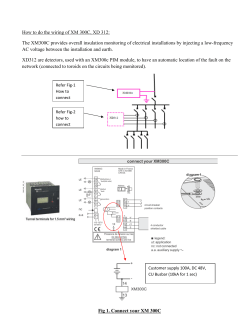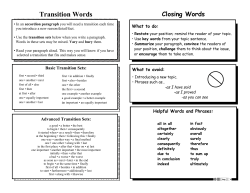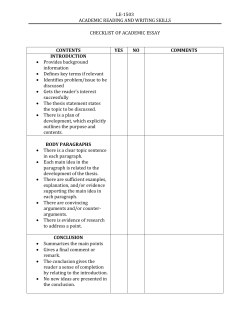
GUIDELINES FOR WRITING PAPER
GUIDELINES FOR WRITING PAPER i. Text should be written Times New Roman 9 pts. ii. The abstract should be self-contained. Do not cite SUMMARY and CHECK LIST 1)Please download template paper to your computer. Then “save as” with a different name (Ex: mytemplate AETS.doc). Now, copy-paste your paper “paragraph by paragraph” to mytemplate AETS.doc references in the abstract. iii. Paragraph - Line Spacing- Single 9)Keywords— : Times New Roman BOLD, 10 pt. i. Text should be written Times New Roman 9 pts ii. Add about four keywords or phrases in alphabetical NOTE: If the “font size or type” of your paper is different, order, separated by commas. you may have problems while pasting it to mytemplate iii. Paragraph - Line Spacing- Single AETS.doc. 10) Except abstract, keywords, figure & table captions, for To solve this font problem: the whole text: 1st Step: Copy- paste the paragraph from your paper to i. Paragraph - Line Spacing- Multiple 1.05. notepad. ii. Alignment: Justified 2nd Step: Copy- paste the paragraph from notepad to iii. Special: First Line: 0.36 cm iv. Font: Times New Roman, 10 pt. mytemplate AETS.doc 2)Do not delete the blank line immediately above the abstract; it sets the footnote at the bottom of this column. IMPORTANT: Before submitting your paper via http://www.aetsjournal.com/submit.php, please check the following instructions on your final paper. 3)Paper Size: Letter 4)Page margins are 1,78 cm top and down; 1,65 cm left and right. 5)Each column width is 8,89 cm and the separation between the columns is 0,51 cm. 6)Paper Title: Times New Roman, 24 pt., Centered, Title Case (Capitalize Each Word), NOT Bold 7)Authors’ Names: Times New Roman, 11 pt., Centered, Title Case (Capitalize Each Word) IMPORTANT: Do NOT write your institution address below your name. See “Affiliation” Fig. 1 Values for text 11) Heading 1: Times New Roman, 10 pt, Centered 1st Step: Capitalize each word. Example: Steps in Modeling and Simulation 2nd Step: Choose and Right click - Font- Effects Small caps X. STEPS IN MODELING AND SIMULATION 8)Abstract— : Times New Roman BOLD, 10 pt. 12) Heading 2: Times New Roman Italic, 10 pt, Capitalize each word. Example: A. Definition of Parallel Manipulator Choose Paragraph: Values should be as in Fig. 1: i. Figures should be centered. ii. All figures should be captioned. Captions should be written “Times New Roman, 9 pt., centered” iii. Please do not include captions as part of the figures. iv. Do not put captions in “text boxes” linked to the figures. v. Do not put borders around the outside of your figures. vi. Use the abbreviation “Fig.” even at the beginning of a sentence. WRONG: Figure 2.1 represents... CORRECT: Fig. 2 represents… Fig. 2 Values for Heading 2 COMMON MISTAKES: 1.1 Definition of Parallel Manipulator, 2.3 Definition of Parallel Manipulator etc… 13) Heading 3: Times New Roman, 10 pt, Capitalize each word. Values should be as in Fig. 1. Example: Fig. 3 Values for figures 1. Mobility Equation 17) Tables: Large tables may span both columns. 14) Introduction Part: First letter should be Times New Roman 28 pts. Whole word should be written in “Upper Case”. 15) Affiliation: Times New Roman, 8 pt. Affiliation part should be written at the bottom of the first page on the left as: Sponsor and financial support acknowledgments can be written here. Name Surname is with the National Institute of Standards and Technology, Boulder, CO 80305 USA (corresponding author to provide phone: 505-5555555; fax: 505-555-5555; e-mail: author@ boulder.nist.gov). 16) Figures: Large figures may span both columns. If your figure has two parts, include the labels “(a)” and “(b)” as part of the artwork. (Ex: Fig. 3 (a) Mapping nonlinear data...) i. Tables should be centered. ii. All tables should be captioned. Captions should be written “Times New Roman, 8 pt., centered” iii. Please do not include captions as part of the tables. iv. Word “TABLE”: Upper case, Number: Tables are numbered with Roman numerals v. Caption: Capitilize each word: Units for Magnetic Properties THEN Font-Effects-Small Caps Result: TABLE I UNITS FOR MAGNETIC PROPERTIES COMMON MISTAKES: Table 1, Table 2.1 etc.. 25) The following link includes some of the troublesome 18) Equations: i. Number equations consecutively with equation numbers in parentheses flush with the right margin, as in (1). ii. Refer to “(1),” not “Eq. (1)” or “equation (1),” except at the beginning of a sentence: “Equation (1) is ... .” Ru K w LW c (1) (Align equation to the right) 19) References: i. Number citations consecutively in square brackets [1]. ii. The sentence punctuation follows the brackets [2]. iii. Multiple references [2], [3] are each numbered with separate brackets [1]–[3]. iv. When citing a section in a book, please give the relevant page numbers [2]. v. In sentences, refer simply to the reference number, as [3]. vi. Do not use “Ref. [3]” or “reference [3]” except at the beginning of a sentence: “Reference [3] shows ....” COMMON MISTAKES: ……. load carrying capacity of the weld (Mellor, 99). 20) Acknowledgment: COMMON MISTAKES: Acknowledgement Correct form: ACKNOWLEDGMENT (No “e” after “g”) Avoid expressions such as “One of us (S.B.A.) would like to thank ... .” 21) Do not change the font sizes or line spacing to squeeze more text. There is no page limitation. 22) Use italics for emphasis; do not underline. 23) Text should be written in the third person to avoid sounding like an autobiographical account penned by a narcissistic author. Prefer: “It is possible to ..” than to say “One could ...”. 24) Avoid using above (“the above method,” “mentioned above,” etc.) or below (in the figure below). Be specific. words, terms, and expressions most frequently found in Experiment Station journal paper and manuscripts: http://www.ag.iastate.edu/aginfo/checklist.php bulletin
© Copyright 2025














